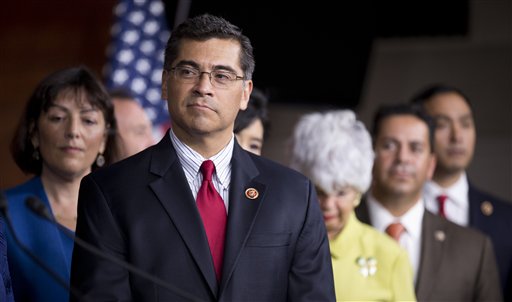The Democrats announced a House immigration reform bill Wednesday, bringing to light the 11 million undocumented U.S. immigrants lost in the legislative shuffle of Capitol Hill’s deadline-driven fiscal crises.
Videos by Rare
Those 11 million undocumented immigrants made headlines all summer long as the subject one of President Obama’s chief legislative efforts, and the leading agenda in the U.S. Senate until it’s passage in late June. The House bill, unveiled today by a team of Democrats led by Minority Leader and California Rep. Nancy Pelosi, Xavier Becerra of California and Congressional Hispanic Caucus Chairman Ruben Hinojosa, is an answer to both the Senate and the majority Republican Caucus in the House.
After the Senate passed a lengthy 1,200 comprehensive immigration reform bill drafted by a bipartisan “gang of eight” sponsors, Ohio Republican and Speaker of the House John Boehner announced the House would not modify or vote on the Senate bill, instead choosing to take up immigration reform as a series of smaller bills.
Though a majority of lawmakers in both chambers agree the U.S.’s immigration policy is severely outdated, ineffective, and in need of reform, House Republicans were especially wary of the lengthy Senate bill that narrowly passed with no small amount of constituent, media, and congressional resistance. Even beloved tea party Republican, Florida senator and 2016 presidential favorite Marco Rubio came under fire from his political base and congressional colleagues for his unwavering lead support of the bill as a member of the gang of eight.
Boehner’s House piecemeal approach has yet to gain serious traction, stalled first by Congress’s annual August recess and now by partisan fiscal fights that have led to a government shutdown, with another debate over the much more ominous debt ceiling looming over mid-October.
The new House Democrat immigration reform bill stands apart from the Senate version on the one provision that allowed it to pass the upper chamber — border security.
Democrats in the Senate lacked across-the-aisle support needed to pass the bill until two Republicans – Sens. John Hoeven of North Dakota and Bob Corker of Tennessee – proposed an amendment requiring major border security provisions be installed before the “pathway to citizenship” for the 11 million undocumented immigrants could go into effect.
Hoeven-Corker mandates an additional 350 miles of fencing along the border, 20,000 additional border patrol agents, an employee verification system, an electronic entry/exit system at all ports of entry to the U.S. and cooperation and agreement between various agencies including Homeland Security and U.S. Customs and Border Patrol before green card statuses could be given.
Despite the provisions, Republican Senators like Iowa’s Chuck Grassley opposed the bill, saying he witnessed Congress pass similar legislation in 1986 only to amend security provisions later and allow citizenship of the then three million undocumented immigrants first, leading directly to the burgeoning problem of 11 million immigrants living illegally in the U.S. today.
That speculation bled into the House’s distrust of the sizable Senate bill, but House Democrats have an answer. Before the upper chamber even brought its bill to a vote, the House Homeland Security Committee remarkably passed a bipartisan border-security plan. Now, House Democrats have swapped out Hoeven-Corker with this plan and are calling on the House GOP majority to bring it to the floor.
The House plan mandates the Department of Homeland Security to successfully stop no less than 90 percent of illegal border traffic along high-risk areas within the first two years, and across the entire southern U.S. border within five. Though unanimously agreed to, the House plan lacks the specifics in cost, technology, and inter-agency cooperation spelled out by Hoeven-Corker.
With the rest of the Senate’s comprehensive immigration reform bill firmly in place within the House bill, the majority media analysis on Capitol Hill speculates the bill stands little chance of making it to the floor for several reasons. The legislative calendar space left will likely be absorbed by the shut down and fiscal debates, which will continue to take precedence up through mid-October when Congress will vote on the debt ceiling, and the fact of the House GOP’s intention to never take up the Senate version anyway.
House Democrats expressed the desire Wednesday to at the very least keep immigration reform alive and from falling into legislative obscurity, but the majority in the media and on Capitol Hill agree that despite its former congressional and media spotlight, immigration reform stands little chance of passage in 2013.
Related articles
- House Dems to roll out immigration package (thehill.com)
- Report: House Minority Leader Nancy Pelosi, D-Calif., plans to introduce immigration reform bill, sources tell @politico (politico.com)
- House Dems to Introduce Immigration Legislation on Day 2 of Gov’t Shutdown (breitbart.com)



